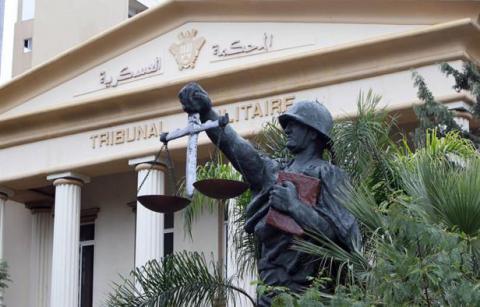
Lebanese Military Court (Source: Al Joumhouria)

LEBANON
 Our Concerns
Our Concerns
- Recurrent violations committed by the security services in the context of counter-terrorism, including the routine practice of torture, regularly used to extract confessions;
- Trial of civilians by exceptional jurisdictions, namely military courts and the Judicial Council;
- Judicial harassment of citizens for expressing their opinions, including on social media.
 Upcoming
Upcoming
• March 2018: Review of Lebanon by the Human Rights Committee.
The Syrian conflict continued to spill over into Lebanon in 2017. The country hosts 1.5 million Syrian refugees, 70% of whom are living below the poverty line. Although the security situation does not allow it, an ever-growing number of politicians are calling for Syrian refugees to be sent back to their country, and violence and hate-motivated crimes against Syrian refugees have risen sharply over the course of the year.
With regards to the military, Hezbollah launched a military operation in the region of Jurd Arsal in July 2017. A month later, the Lebanese army launched an offensive against Islamic State’s last stronghold, located in the areas of Ras Baalbeck and Al Qaa. Although the Lebanese authorities denied any form of coordination, the Syrian army and Hezbollah launched a simultaneous offensive on the Syrian side of the Qalamoun mountains. After a week-long battle, an evacuation deal facilitated by Hezbollah was concluded, allowing Islamic State (IS) militants to evacuate the Syrian-Lebanese border towards the Syrian town of Deir Ez Zor. In exchange, militants identified where they had buried the remains of Lebanese soldiers captured in Arsal in 2014.
On November 4, in the context of growing tensions between Saudi Arabia and Iran, the prime minister of Lebanon, Saad Hariri, announced his resignation in a speech made while in Saudi Arabia, citing assassination fears and Iran’s “unacceptable influence” over Lebanese politics via Hezbollah. Given the ambiguous circumstances of the announcement, both the Lebanese government and the public demanded the return of Saad Hariri, accusing the Saudi Kingdom of holding the outgoing prime minister against his will. Following international pressure, notably from France, Saad Hariri returned to Lebanon on November 22. On this occasion, he offered his resignation to President Michel Aoun, but accepted the president’s suggestion to “postpone” the decision. Two weeks later, he reversed his decision to resign.
In June, the parliament approved a new electoral law, which will govern the parliamentary elections scheduled for spring 2018. The text replaced the former “winner takes it all” system with proportional representation, and reduced the number of electoral districts in the country. Lebanon has not held parliamentary elections since 2009 as polls have been repeatedly postponed.
Lastly, although the Lebanese Parliament approved a law establishing a National Human Rights Institute - including a national preventive mechanism against torture - in 2016, the institute is not yet operational, its members are yet to be appointed by the government, and no budget has been allocated.

Abuses committed in the fight against terrorism
In an unstable security context, individuals suspected of terrorism have continued to be subjected to abuses, in particular periods of incommunicado detention during which they are subjected to torture and other ill-treatment, and forced to make self-incriminating statements. Furthermore, under article 108 of the Code of Criminal Procedure, pre-trial detention can be renewed indefinitely for those charged for attacks against state security and acts of terrorism.
“In an unstable security context, individuals suspected of terrorism have continued to be subjected to abuses.”
In July, reports of death under torture emerged following raids conducted by the Lebanese army on June 30 on two unofficial refugee camps in the north-eastern border town of Arsal. In retaliation to an attack by five suicide bombers, the army arrested around 350 people, four of whom died in military custody. Despite visible signs of torture on their bodies, the military prosecutor issued a statement saying that a forensic report had concluded that they died of “natural causes”. The full investigation file has been neither published nor provided to the families, casting serious doubts over the independence, impartiality and thoroughness of the investigation.
In May, the UN Committee against Torture (CAT) published its Concluding Observations following its first review of Lebanon. The UN experts deplored the fact that security forces “continue to routinely use torture” on detainees, including children, to “extract confessions to be used in criminal proceedings or as a form of punishment”. They recalled that no exceptional circumstances whatsoever – including the threat of terrorist acts – could be invoked as a justification of torture.
The CAT also addressed the issue of refugees, and expressed concern over practices contrary to the principle of non-refoulement. The experts reminded Lebanon that the Convention afforded “absolute protection” to anyone under its jurisdiction, “regardless of the person’s nationality, judicial status or the danger that he or she may pose to society”.
In this regard, they echoed Alkarama’s concerns by raising the case of an Iraqi refugee who was at risk of extradition to his home country despite risks of torture and even execution. He had been arrested in Lebanon in January 2016 and subsequently sentenced by the Military Court for allegedly “joining a terrorist group” on the sole basis of information provided by the Iraqi intelligence services. Despite the UN experts’ intervention, on May 3, he was extradited to Iraq, in violation of the Convention against Torture.

Freedom of expression increasingly under attack
Although Lebanon is often portrayed as a model in the region when it comes to freedom of expression, there are a number of red lines, such as criticising the Lebanese president or army, which should not be crossed. Peaceful criticism is systematically considered as libel or defamation of public officials and punished with up to a year in prison under the Penal Code. In recent years, there has been an increased crackdown on citizens peacefully expressing political opinions on social media.
For instance, on May 26, 2017, Selman Samaha was summoned by the Military Tribunal to appear on charges of “offending the reputation of the military institution” after publishing comments regarding the Lebanese military on his Facebook page. In an open letter, Alkarama and other local and international NGOs expressed concern over his prosecution and emphasised that his case was “only the latest in a series of arrests, investigations, and trials of citizens for expressing political opinions on social media” which was “threatening the right to freedom of expression in Lebanon”.
In preparation for Lebanon’s review, which will take place in March 2018, the Human Rights Committee raised several concerns in its List of Issues related to the right to freedom of expression enshrined in article 19 of the International Covenant on Civil and Political Rights.
In particular, it requested that the authorities respond to “concerns that the vague and broad formulation of “defamation”, “libel” and “insult”, and the broad authority and grounds for censorship and ban of any foreign publication, of intellectual or artistic work, including films and printed materials, can be used to unduly restrict freedom of expression.”

New Anti-Torture Law fails to meet international standards
O n October 26, a new anti-torture law aimed at punishing torture and other cruel, inhuman or degrading treatment or punishment entered into force. The legislation, the first of its kind, suffers from numerous setbacks compared to a promising 2012 draft, and fails to meet the standards enshrined in the UN Convention against Torture (UNCAT).
Indeed, the law introduces restrictive elements to the definition of torture spelled out in article 401 of the Penal Code. The offence of torture is limited to acts performed “during the investigation, preliminary investigation, judicial investigation, trials and executions of sentences”.
This goes against the principle of the absolute prohibition of torture and creates a loophole: for example, a case of torture committed during the arrest and before the preliminary investigation would not fall within the scope of this legislation.
Furthermore, the criminalisation of cruel, inhuman or degrading treatment or punishment as defined in article 16 UNCAT was withdrawn during the deliberations in parliament, further reducing the scope of the bill.
Equally concerning is the fact that the new law introduces penalties for acts of torture that are not commensurate with the gravity of the crime. article 1(b) of the law states that “[a]nyone who perpetrates torture shall be liable to imprisonment from one to three years of imprisonment if torture does not result in death or permanent or temporary physical or mental disability.” Such penalties, normally attached to misdemeanours, do not have a deterrent effect, creating a climate of impunity.
If the victim is to die as a result of torture, the perpetrator faces between 10 and 20 years in prison, compared to 30 under the 2012 draft law.
Additionally, the new legislation subjects acts of torture to statutes of limitation. Victims of torture can only initiate proceedings between three and ten years after they have been released from detention. This is concerning since victims are often reluctant to file complaints until they feel safe to do so, which may be well beyond the period set out in the statute of limitation.
While the 2012 draft had proposed that trials for torture cases must be held before civilian courts, the 2017 law has ignored the proposal, leaving open the possibility that perpetrators will be referred to military courts, which lack independence and impartiality, considering their judges are appointed directly by the minister of defence. This is highly problematic as the investigation and prosecution by peers seriously hinders any proper accountability.
By adopting this flawed version of the law, the Lebanese authorities have decided to ignore the recommendations issued by the UN Committee against Torture in 2017, as well as those they pledged to implement during the 2015 Universal Periodic Review before the Human Rights Council.